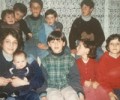Court of Appeals in Belgrade: Three Years Imprisonment For War Crime Against Frail Old Man
 The Court of Appeals in Belgrade has modified the judgment rendered by the Higher Court in Požarevac, by which the accused, Boban Petković, was found guilty of a war crime against a civilian population and sentenced to five years of imprisonment, and decreased his sentence to three years of imprisonment. The Humanitarian Law Center (HLC) holds that three years of imprisonment is an inappropriately mild sentence and that the mitigating circumstances that the Court of Appeals considered in the case of the accused are unacceptable from the standpoint of justice for victims of war crimes.
The Court of Appeals in Belgrade has modified the judgment rendered by the Higher Court in Požarevac, by which the accused, Boban Petković, was found guilty of a war crime against a civilian population and sentenced to five years of imprisonment, and decreased his sentence to three years of imprisonment. The Humanitarian Law Center (HLC) holds that three years of imprisonment is an inappropriately mild sentence and that the mitigating circumstances that the Court of Appeals considered in the case of the accused are unacceptable from the standpoint of justice for victims of war crimes.
The proceedings in this case began in 1999 before the District Court of Požarevac (now the Higher Court), whose first instance judgments were quashed on two occasions, after which the case was sent back for a repeated trial. In February 2013, the Higher Court in Požarevac rendered the third first instance judgment sentencing the accused to five years of imprisonment, because it established that the accused, Boban Petković, in the capacity of a member of the Ministry of the Interior, killed three Kosovo Albanians on May 9th, 1999, in a place called “Rija” at the exit of Orahovac (Kosovo), while he was executing his duty of securing the road. When he saw an old man, Ismail Durguti, running away from the combat zone, he caught him, threw him to the ground and killed him by firing a shot at him with a pistol. Then he headed to a house nearby, where he killed an older married couple, Sezai and Shefkije Miftari, by firing a burst of fire from his automatic rifle.
Deciding on the appeals filed by the Prosecutor and the Defence Counsel, the Court of Appeals in Belgrade opened a main hearing session, during which it, among other things, examined a court ballistics expert. After completing the main hearing, the Court of Appeals found Boban Petković guilty of the murder of Ismail Durguti, but acquitted him of the charges for the murder of Sezai and Shefkije Miftari. The Court of Appeals considered the lack of a previous criminal record, the time that passed from the commission of the act, the material and family situation of the accused, “the seriousness of the situation in which the accused was found at the time in question” and his “mental state” as mitigating circumstances.
The HLC stresses that the trial panel of the Court of Appeals played at justice for the victims in this case, by decreasing the sentence for a war crime below the statutory mandatory minimum by applying a series of inappropriate mitigating circumstances. The passage of time from the commission of the criminal act is a circumstance which should not have been considered in this case, because it is to a great extent a result of the unprofessional work of the court and the unnecessary stalling of the proceedings. The position of the court that the “seriousness of the situation that the accused found himself in at the time in question” represents a mitigating circumstance for the accused is also unacceptable, particularly when the court itself states on page 4 of the judgment, “it has been indisputably established that the victim did not have any insignia pointing to his membership of a terrorist organization, did not have any weapons on him, was running from the direction in which gunfire was heard, was quite old and in a serious condition, as he had already been wounded”. It was in such a “situation” that Petković caught the late Ismail Durguti and threw him to the ground, then snatched a pistol from the hands of another member of the Ministry of the Interior and fired a shot to the chin of the victim, which points to the utter wantonness and brutality of the accused, and therefore to the conclusion that this fact should have been taken as an aggravating circumstance. The Court of Appeals also failed to offer a reasoning for the “mental state” of the accused as being a justification for the mitigation of the sentence below the statutory mandatory minimum.
The judgment of the Court of Appeals in Belgrade contains a number of other problematic findings, which will be subject to a more detailed analysis in the annual report on war crimes trials in 2014.
The HLC points out that the case of Boban Petković is one of dozens of cases which have remained under the jurisdiction of courts and prosecutions of general jurisdiction even after the establishment of specialized institutions for the prosecution of war crimes. In each of these cases monitored by the HLC, including the case of Boban Petković, the monitors noted obvious violations of the law, indifference and biased prosecutions and courts towards Serbian perpetrators, as well as a very mild penal policy. Therefore, the HLC calls for the Public Prosecutor’s Office of the Republic of Serbia and the OWCP to transfer these cases to the jurisdiction of the OWCP, in line with the Law on Public Prosecution, in order to have these cases conducted in line with the principles of legality and justice.







